Leadership and Management in Hospitality: Four Seasons Hotel Report
VerifiedAdded on 2020/12/10
|10
|2574
|137
Report
AI Summary
This report delves into the pivotal role of a manager within the hospitality industry, using the Four Seasons Hotel as a focal point. It begins by outlining the company's vision, goals, and operational approach, drawing on publicly available information. The report then explores how managers contribute to the achievement of organizational goals, emphasizing the importance of setting targets, motivating employees, and assigning tasks effectively. Furthermore, it critically examines essential management, leadership, and motivation concepts, highlighting their application in service-oriented organizations. The report also identifies specific management practices, such as training and development, customer focus, and preventive management, that can contribute to service improvement, providing the rationale behind these practices. The conclusion summarizes the key findings, underscoring the significance of effective management in the hospitality sector. This report is a valuable resource for students seeking to understand the intricacies of hotel management and leadership within the industry.
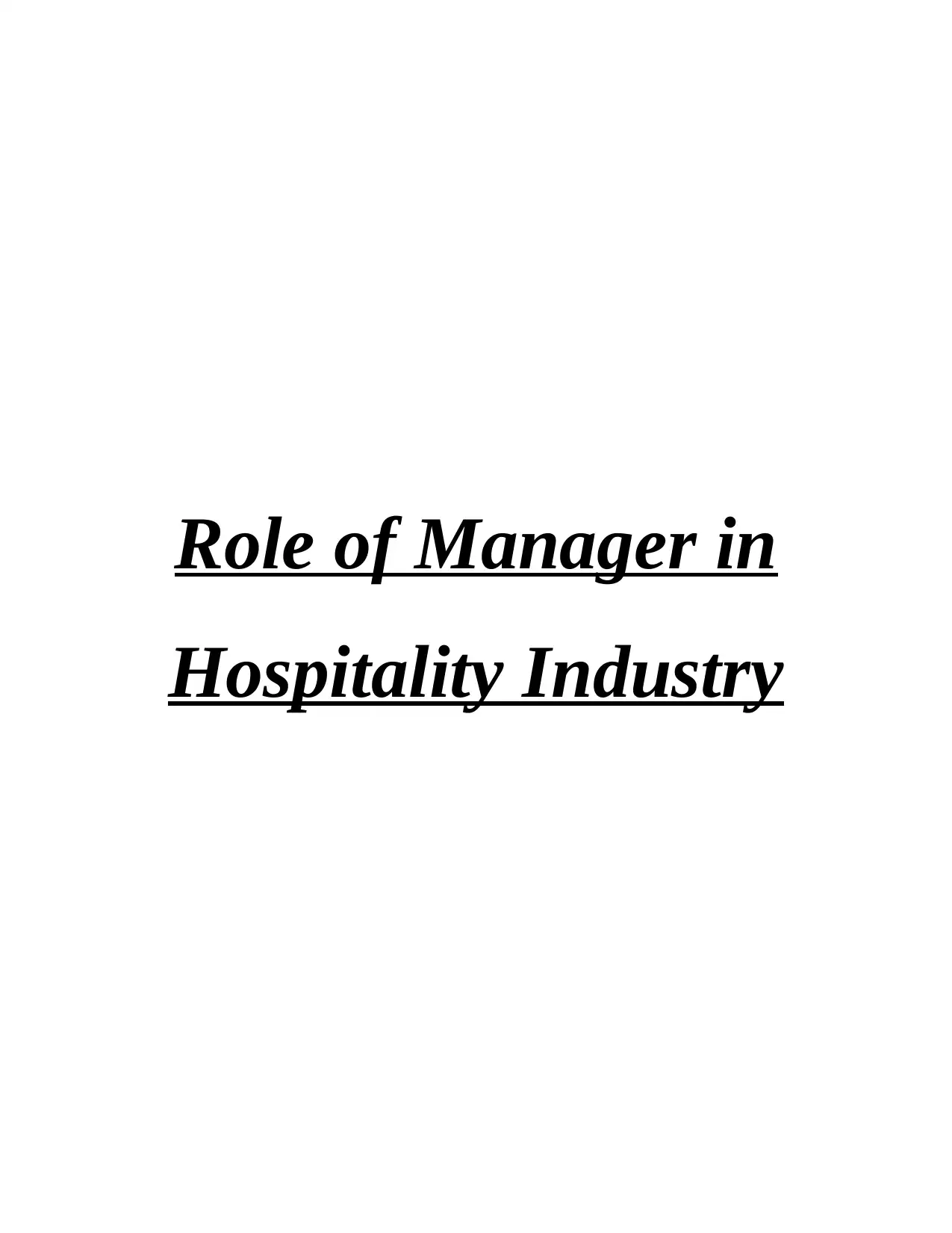
Role of Manager in
Hospitality Industry
Hospitality Industry
Paraphrase This Document
Need a fresh take? Get an instant paraphrase of this document with our AI Paraphraser
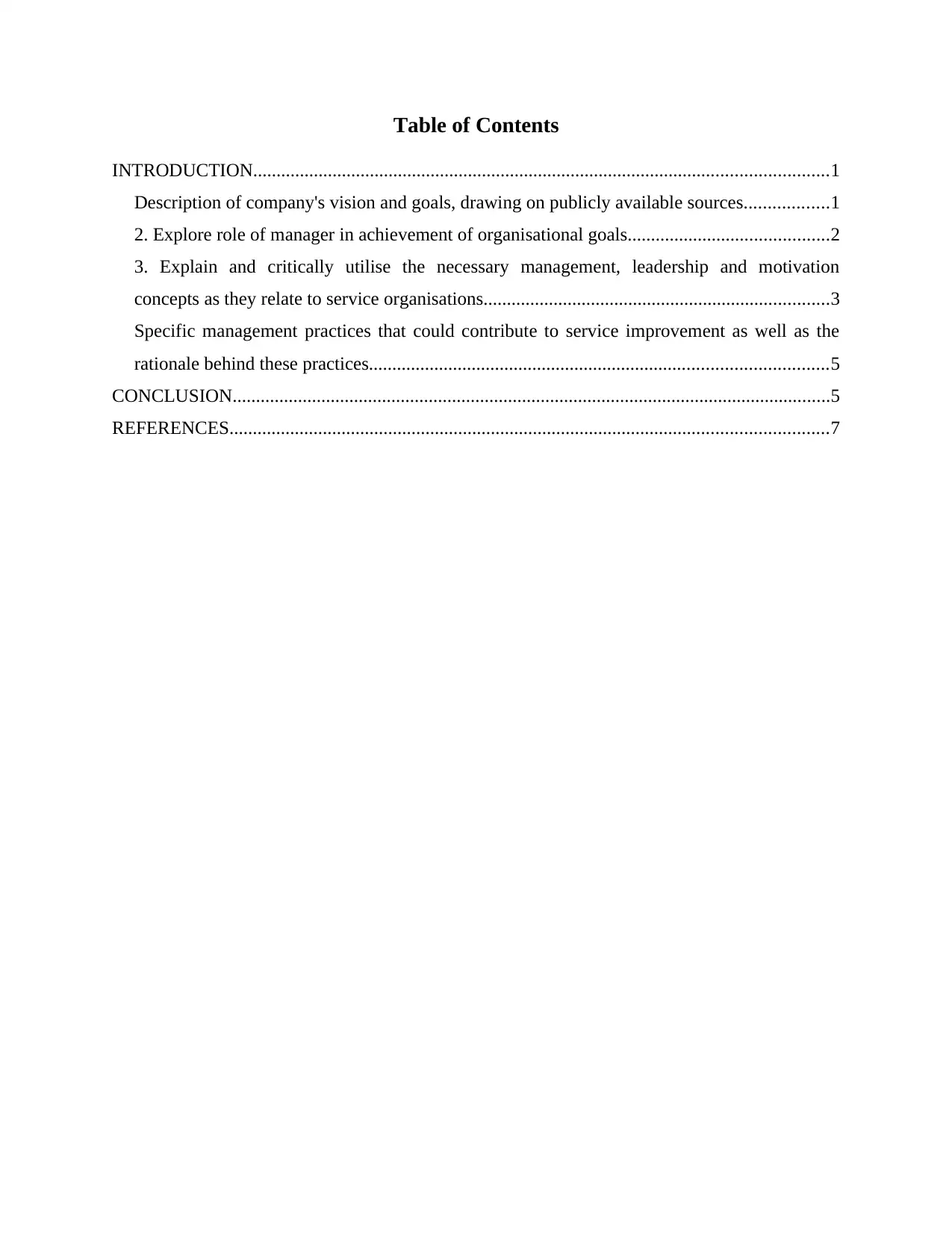
Table of Contents
INTRODUCTION...........................................................................................................................1
Description of company's vision and goals, drawing on publicly available sources..................1
2. Explore role of manager in achievement of organisational goals...........................................2
3. Explain and critically utilise the necessary management, leadership and motivation
concepts as they relate to service organisations..........................................................................3
Specific management practices that could contribute to service improvement as well as the
rationale behind these practices..................................................................................................5
CONCLUSION................................................................................................................................5
REFERENCES................................................................................................................................7
INTRODUCTION...........................................................................................................................1
Description of company's vision and goals, drawing on publicly available sources..................1
2. Explore role of manager in achievement of organisational goals...........................................2
3. Explain and critically utilise the necessary management, leadership and motivation
concepts as they relate to service organisations..........................................................................3
Specific management practices that could contribute to service improvement as well as the
rationale behind these practices..................................................................................................5
CONCLUSION................................................................................................................................5
REFERENCES................................................................................................................................7

⊘ This is a preview!⊘
Do you want full access?
Subscribe today to unlock all pages.

Trusted by 1+ million students worldwide
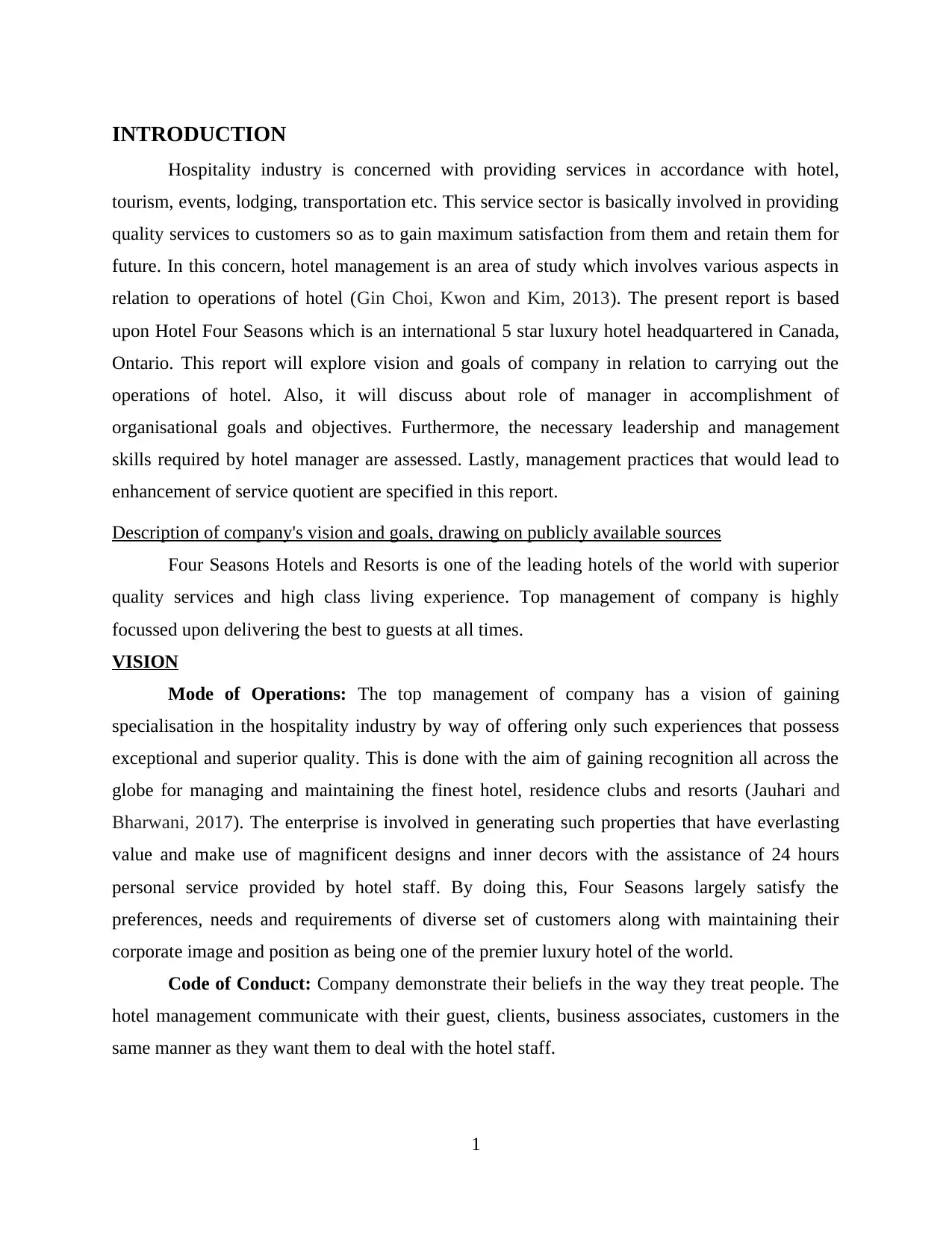
INTRODUCTION
Hospitality industry is concerned with providing services in accordance with hotel,
tourism, events, lodging, transportation etc. This service sector is basically involved in providing
quality services to customers so as to gain maximum satisfaction from them and retain them for
future. In this concern, hotel management is an area of study which involves various aspects in
relation to operations of hotel (Gin Choi, Kwon and Kim, 2013). The present report is based
upon Hotel Four Seasons which is an international 5 star luxury hotel headquartered in Canada,
Ontario. This report will explore vision and goals of company in relation to carrying out the
operations of hotel. Also, it will discuss about role of manager in accomplishment of
organisational goals and objectives. Furthermore, the necessary leadership and management
skills required by hotel manager are assessed. Lastly, management practices that would lead to
enhancement of service quotient are specified in this report.
Description of company's vision and goals, drawing on publicly available sources
Four Seasons Hotels and Resorts is one of the leading hotels of the world with superior
quality services and high class living experience. Top management of company is highly
focussed upon delivering the best to guests at all times.
VISION
Mode of Operations: The top management of company has a vision of gaining
specialisation in the hospitality industry by way of offering only such experiences that possess
exceptional and superior quality. This is done with the aim of gaining recognition all across the
globe for managing and maintaining the finest hotel, residence clubs and resorts (Jauhari and
Bharwani, 2017). The enterprise is involved in generating such properties that have everlasting
value and make use of magnificent designs and inner decors with the assistance of 24 hours
personal service provided by hotel staff. By doing this, Four Seasons largely satisfy the
preferences, needs and requirements of diverse set of customers along with maintaining their
corporate image and position as being one of the premier luxury hotel of the world.
Code of Conduct: Company demonstrate their beliefs in the way they treat people. The
hotel management communicate with their guest, clients, business associates, customers in the
same manner as they want them to deal with the hotel staff.
1
Hospitality industry is concerned with providing services in accordance with hotel,
tourism, events, lodging, transportation etc. This service sector is basically involved in providing
quality services to customers so as to gain maximum satisfaction from them and retain them for
future. In this concern, hotel management is an area of study which involves various aspects in
relation to operations of hotel (Gin Choi, Kwon and Kim, 2013). The present report is based
upon Hotel Four Seasons which is an international 5 star luxury hotel headquartered in Canada,
Ontario. This report will explore vision and goals of company in relation to carrying out the
operations of hotel. Also, it will discuss about role of manager in accomplishment of
organisational goals and objectives. Furthermore, the necessary leadership and management
skills required by hotel manager are assessed. Lastly, management practices that would lead to
enhancement of service quotient are specified in this report.
Description of company's vision and goals, drawing on publicly available sources
Four Seasons Hotels and Resorts is one of the leading hotels of the world with superior
quality services and high class living experience. Top management of company is highly
focussed upon delivering the best to guests at all times.
VISION
Mode of Operations: The top management of company has a vision of gaining
specialisation in the hospitality industry by way of offering only such experiences that possess
exceptional and superior quality. This is done with the aim of gaining recognition all across the
globe for managing and maintaining the finest hotel, residence clubs and resorts (Jauhari and
Bharwani, 2017). The enterprise is involved in generating such properties that have everlasting
value and make use of magnificent designs and inner decors with the assistance of 24 hours
personal service provided by hotel staff. By doing this, Four Seasons largely satisfy the
preferences, needs and requirements of diverse set of customers along with maintaining their
corporate image and position as being one of the premier luxury hotel of the world.
Code of Conduct: Company demonstrate their beliefs in the way they treat people. The
hotel management communicate with their guest, clients, business associates, customers in the
same manner as they want them to deal with the hotel staff.
1
Paraphrase This Document
Need a fresh take? Get an instant paraphrase of this document with our AI Paraphraser
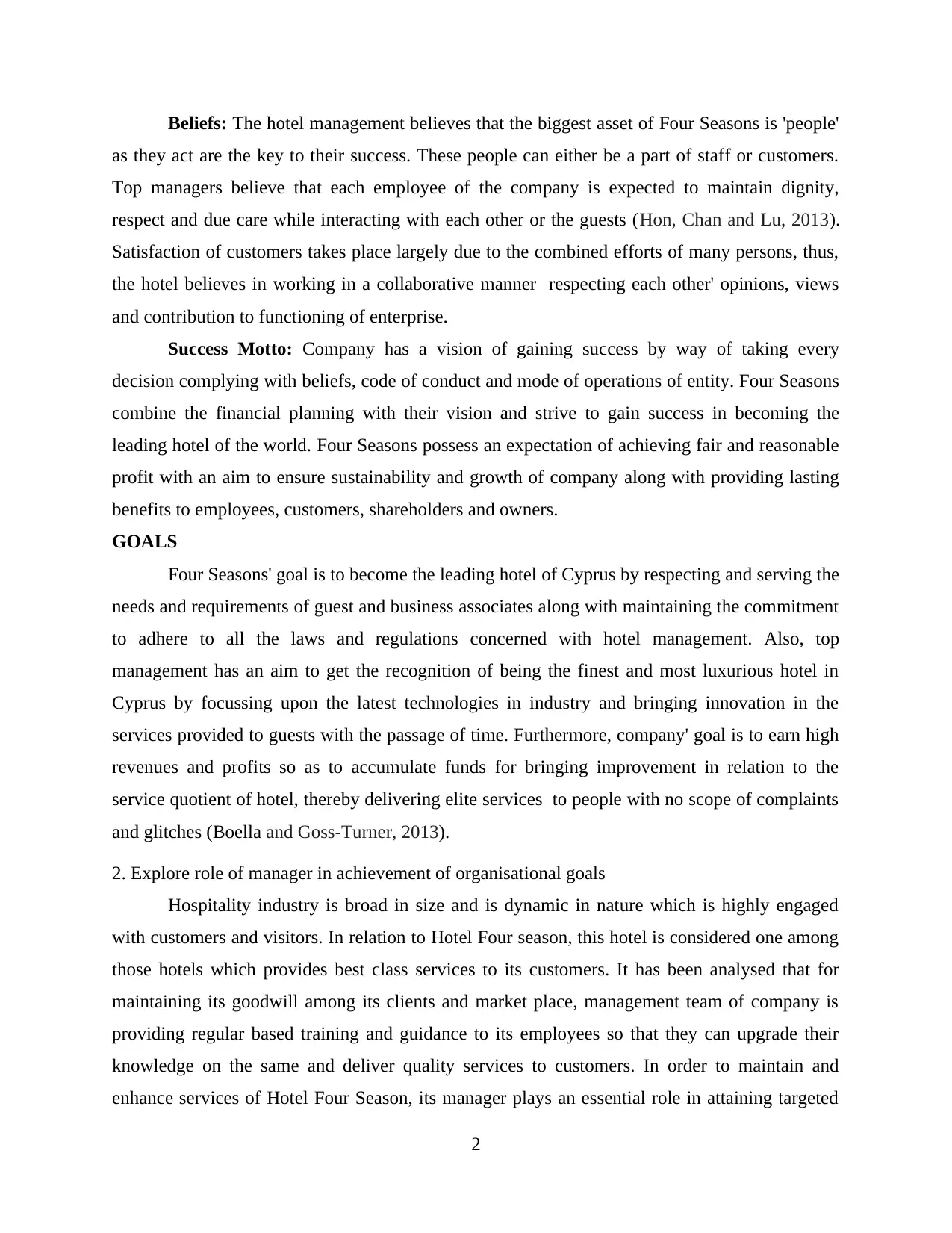
Beliefs: The hotel management believes that the biggest asset of Four Seasons is 'people'
as they act are the key to their success. These people can either be a part of staff or customers.
Top managers believe that each employee of the company is expected to maintain dignity,
respect and due care while interacting with each other or the guests (Hon, Chan and Lu, 2013).
Satisfaction of customers takes place largely due to the combined efforts of many persons, thus,
the hotel believes in working in a collaborative manner respecting each other' opinions, views
and contribution to functioning of enterprise.
Success Motto: Company has a vision of gaining success by way of taking every
decision complying with beliefs, code of conduct and mode of operations of entity. Four Seasons
combine the financial planning with their vision and strive to gain success in becoming the
leading hotel of the world. Four Seasons possess an expectation of achieving fair and reasonable
profit with an aim to ensure sustainability and growth of company along with providing lasting
benefits to employees, customers, shareholders and owners.
GOALS
Four Seasons' goal is to become the leading hotel of Cyprus by respecting and serving the
needs and requirements of guest and business associates along with maintaining the commitment
to adhere to all the laws and regulations concerned with hotel management. Also, top
management has an aim to get the recognition of being the finest and most luxurious hotel in
Cyprus by focussing upon the latest technologies in industry and bringing innovation in the
services provided to guests with the passage of time. Furthermore, company' goal is to earn high
revenues and profits so as to accumulate funds for bringing improvement in relation to the
service quotient of hotel, thereby delivering elite services to people with no scope of complaints
and glitches (Boella and Goss-Turner, 2013).
2. Explore role of manager in achievement of organisational goals
Hospitality industry is broad in size and is dynamic in nature which is highly engaged
with customers and visitors. In relation to Hotel Four season, this hotel is considered one among
those hotels which provides best class services to its customers. It has been analysed that for
maintaining its goodwill among its clients and market place, management team of company is
providing regular based training and guidance to its employees so that they can upgrade their
knowledge on the same and deliver quality services to customers. In order to maintain and
enhance services of Hotel Four Season, its manager plays an essential role in attaining targeted
2
as they act are the key to their success. These people can either be a part of staff or customers.
Top managers believe that each employee of the company is expected to maintain dignity,
respect and due care while interacting with each other or the guests (Hon, Chan and Lu, 2013).
Satisfaction of customers takes place largely due to the combined efforts of many persons, thus,
the hotel believes in working in a collaborative manner respecting each other' opinions, views
and contribution to functioning of enterprise.
Success Motto: Company has a vision of gaining success by way of taking every
decision complying with beliefs, code of conduct and mode of operations of entity. Four Seasons
combine the financial planning with their vision and strive to gain success in becoming the
leading hotel of the world. Four Seasons possess an expectation of achieving fair and reasonable
profit with an aim to ensure sustainability and growth of company along with providing lasting
benefits to employees, customers, shareholders and owners.
GOALS
Four Seasons' goal is to become the leading hotel of Cyprus by respecting and serving the
needs and requirements of guest and business associates along with maintaining the commitment
to adhere to all the laws and regulations concerned with hotel management. Also, top
management has an aim to get the recognition of being the finest and most luxurious hotel in
Cyprus by focussing upon the latest technologies in industry and bringing innovation in the
services provided to guests with the passage of time. Furthermore, company' goal is to earn high
revenues and profits so as to accumulate funds for bringing improvement in relation to the
service quotient of hotel, thereby delivering elite services to people with no scope of complaints
and glitches (Boella and Goss-Turner, 2013).
2. Explore role of manager in achievement of organisational goals
Hospitality industry is broad in size and is dynamic in nature which is highly engaged
with customers and visitors. In relation to Hotel Four season, this hotel is considered one among
those hotels which provides best class services to its customers. It has been analysed that for
maintaining its goodwill among its clients and market place, management team of company is
providing regular based training and guidance to its employees so that they can upgrade their
knowledge on the same and deliver quality services to customers. In order to maintain and
enhance services of Hotel Four Season, its manager plays an essential role in attaining targeted
2
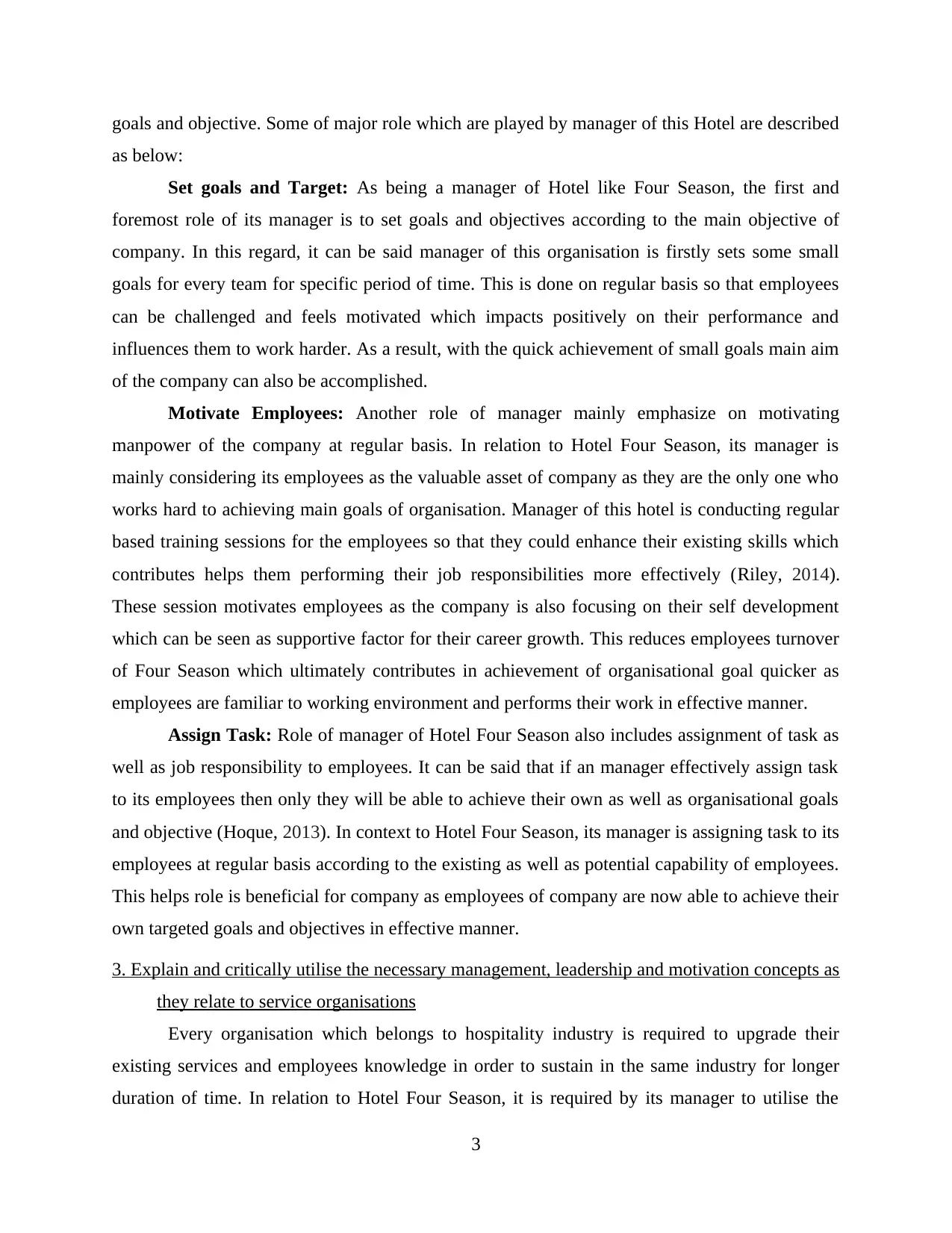
goals and objective. Some of major role which are played by manager of this Hotel are described
as below:
Set goals and Target: As being a manager of Hotel like Four Season, the first and
foremost role of its manager is to set goals and objectives according to the main objective of
company. In this regard, it can be said manager of this organisation is firstly sets some small
goals for every team for specific period of time. This is done on regular basis so that employees
can be challenged and feels motivated which impacts positively on their performance and
influences them to work harder. As a result, with the quick achievement of small goals main aim
of the company can also be accomplished.
Motivate Employees: Another role of manager mainly emphasize on motivating
manpower of the company at regular basis. In relation to Hotel Four Season, its manager is
mainly considering its employees as the valuable asset of company as they are the only one who
works hard to achieving main goals of organisation. Manager of this hotel is conducting regular
based training sessions for the employees so that they could enhance their existing skills which
contributes helps them performing their job responsibilities more effectively (Riley, 2014).
These session motivates employees as the company is also focusing on their self development
which can be seen as supportive factor for their career growth. This reduces employees turnover
of Four Season which ultimately contributes in achievement of organisational goal quicker as
employees are familiar to working environment and performs their work in effective manner.
Assign Task: Role of manager of Hotel Four Season also includes assignment of task as
well as job responsibility to employees. It can be said that if an manager effectively assign task
to its employees then only they will be able to achieve their own as well as organisational goals
and objective (Hoque, 2013). In context to Hotel Four Season, its manager is assigning task to its
employees at regular basis according to the existing as well as potential capability of employees.
This helps role is beneficial for company as employees of company are now able to achieve their
own targeted goals and objectives in effective manner.
3. Explain and critically utilise the necessary management, leadership and motivation concepts as
they relate to service organisations
Every organisation which belongs to hospitality industry is required to upgrade their
existing services and employees knowledge in order to sustain in the same industry for longer
duration of time. In relation to Hotel Four Season, it is required by its manager to utilise the
3
as below:
Set goals and Target: As being a manager of Hotel like Four Season, the first and
foremost role of its manager is to set goals and objectives according to the main objective of
company. In this regard, it can be said manager of this organisation is firstly sets some small
goals for every team for specific period of time. This is done on regular basis so that employees
can be challenged and feels motivated which impacts positively on their performance and
influences them to work harder. As a result, with the quick achievement of small goals main aim
of the company can also be accomplished.
Motivate Employees: Another role of manager mainly emphasize on motivating
manpower of the company at regular basis. In relation to Hotel Four Season, its manager is
mainly considering its employees as the valuable asset of company as they are the only one who
works hard to achieving main goals of organisation. Manager of this hotel is conducting regular
based training sessions for the employees so that they could enhance their existing skills which
contributes helps them performing their job responsibilities more effectively (Riley, 2014).
These session motivates employees as the company is also focusing on their self development
which can be seen as supportive factor for their career growth. This reduces employees turnover
of Four Season which ultimately contributes in achievement of organisational goal quicker as
employees are familiar to working environment and performs their work in effective manner.
Assign Task: Role of manager of Hotel Four Season also includes assignment of task as
well as job responsibility to employees. It can be said that if an manager effectively assign task
to its employees then only they will be able to achieve their own as well as organisational goals
and objective (Hoque, 2013). In context to Hotel Four Season, its manager is assigning task to its
employees at regular basis according to the existing as well as potential capability of employees.
This helps role is beneficial for company as employees of company are now able to achieve their
own targeted goals and objectives in effective manner.
3. Explain and critically utilise the necessary management, leadership and motivation concepts as
they relate to service organisations
Every organisation which belongs to hospitality industry is required to upgrade their
existing services and employees knowledge in order to sustain in the same industry for longer
duration of time. In relation to Hotel Four Season, it is required by its manager to utilise the
3
⊘ This is a preview!⊘
Do you want full access?
Subscribe today to unlock all pages.

Trusted by 1+ million students worldwide
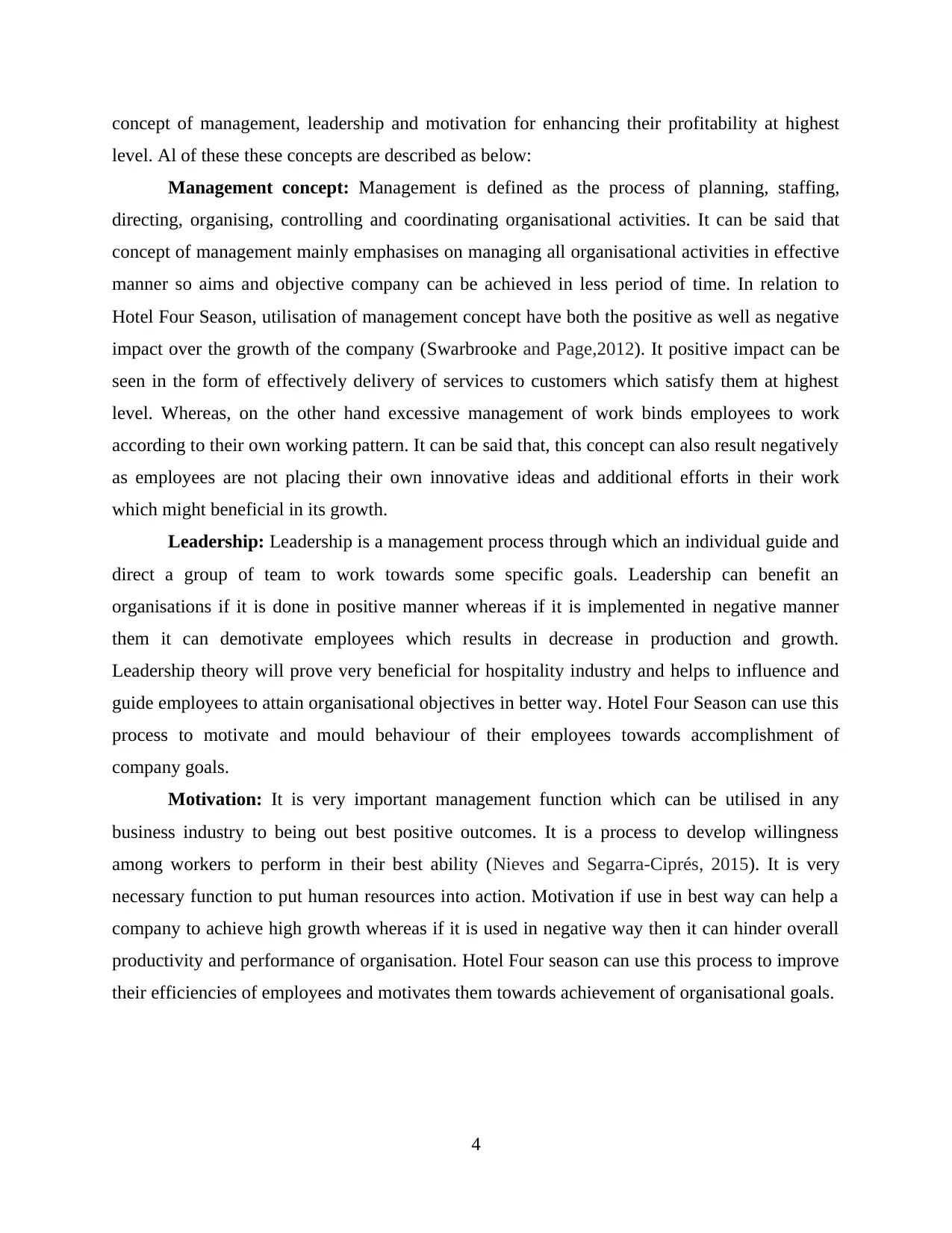
concept of management, leadership and motivation for enhancing their profitability at highest
level. Al of these these concepts are described as below:
Management concept: Management is defined as the process of planning, staffing,
directing, organising, controlling and coordinating organisational activities. It can be said that
concept of management mainly emphasises on managing all organisational activities in effective
manner so aims and objective company can be achieved in less period of time. In relation to
Hotel Four Season, utilisation of management concept have both the positive as well as negative
impact over the growth of the company (Swarbrooke and Page,2012). It positive impact can be
seen in the form of effectively delivery of services to customers which satisfy them at highest
level. Whereas, on the other hand excessive management of work binds employees to work
according to their own working pattern. It can be said that, this concept can also result negatively
as employees are not placing their own innovative ideas and additional efforts in their work
which might beneficial in its growth.
Leadership: Leadership is a management process through which an individual guide and
direct a group of team to work towards some specific goals. Leadership can benefit an
organisations if it is done in positive manner whereas if it is implemented in negative manner
them it can demotivate employees which results in decrease in production and growth.
Leadership theory will prove very beneficial for hospitality industry and helps to influence and
guide employees to attain organisational objectives in better way. Hotel Four Season can use this
process to motivate and mould behaviour of their employees towards accomplishment of
company goals.
Motivation: It is very important management function which can be utilised in any
business industry to being out best positive outcomes. It is a process to develop willingness
among workers to perform in their best ability (Nieves and Segarra-Ciprés, 2015). It is very
necessary function to put human resources into action. Motivation if use in best way can help a
company to achieve high growth whereas if it is used in negative way then it can hinder overall
productivity and performance of organisation. Hotel Four season can use this process to improve
their efficiencies of employees and motivates them towards achievement of organisational goals.
4
level. Al of these these concepts are described as below:
Management concept: Management is defined as the process of planning, staffing,
directing, organising, controlling and coordinating organisational activities. It can be said that
concept of management mainly emphasises on managing all organisational activities in effective
manner so aims and objective company can be achieved in less period of time. In relation to
Hotel Four Season, utilisation of management concept have both the positive as well as negative
impact over the growth of the company (Swarbrooke and Page,2012). It positive impact can be
seen in the form of effectively delivery of services to customers which satisfy them at highest
level. Whereas, on the other hand excessive management of work binds employees to work
according to their own working pattern. It can be said that, this concept can also result negatively
as employees are not placing their own innovative ideas and additional efforts in their work
which might beneficial in its growth.
Leadership: Leadership is a management process through which an individual guide and
direct a group of team to work towards some specific goals. Leadership can benefit an
organisations if it is done in positive manner whereas if it is implemented in negative manner
them it can demotivate employees which results in decrease in production and growth.
Leadership theory will prove very beneficial for hospitality industry and helps to influence and
guide employees to attain organisational objectives in better way. Hotel Four Season can use this
process to motivate and mould behaviour of their employees towards accomplishment of
company goals.
Motivation: It is very important management function which can be utilised in any
business industry to being out best positive outcomes. It is a process to develop willingness
among workers to perform in their best ability (Nieves and Segarra-Ciprés, 2015). It is very
necessary function to put human resources into action. Motivation if use in best way can help a
company to achieve high growth whereas if it is used in negative way then it can hinder overall
productivity and performance of organisation. Hotel Four season can use this process to improve
their efficiencies of employees and motivates them towards achievement of organisational goals.
4
Paraphrase This Document
Need a fresh take? Get an instant paraphrase of this document with our AI Paraphraser
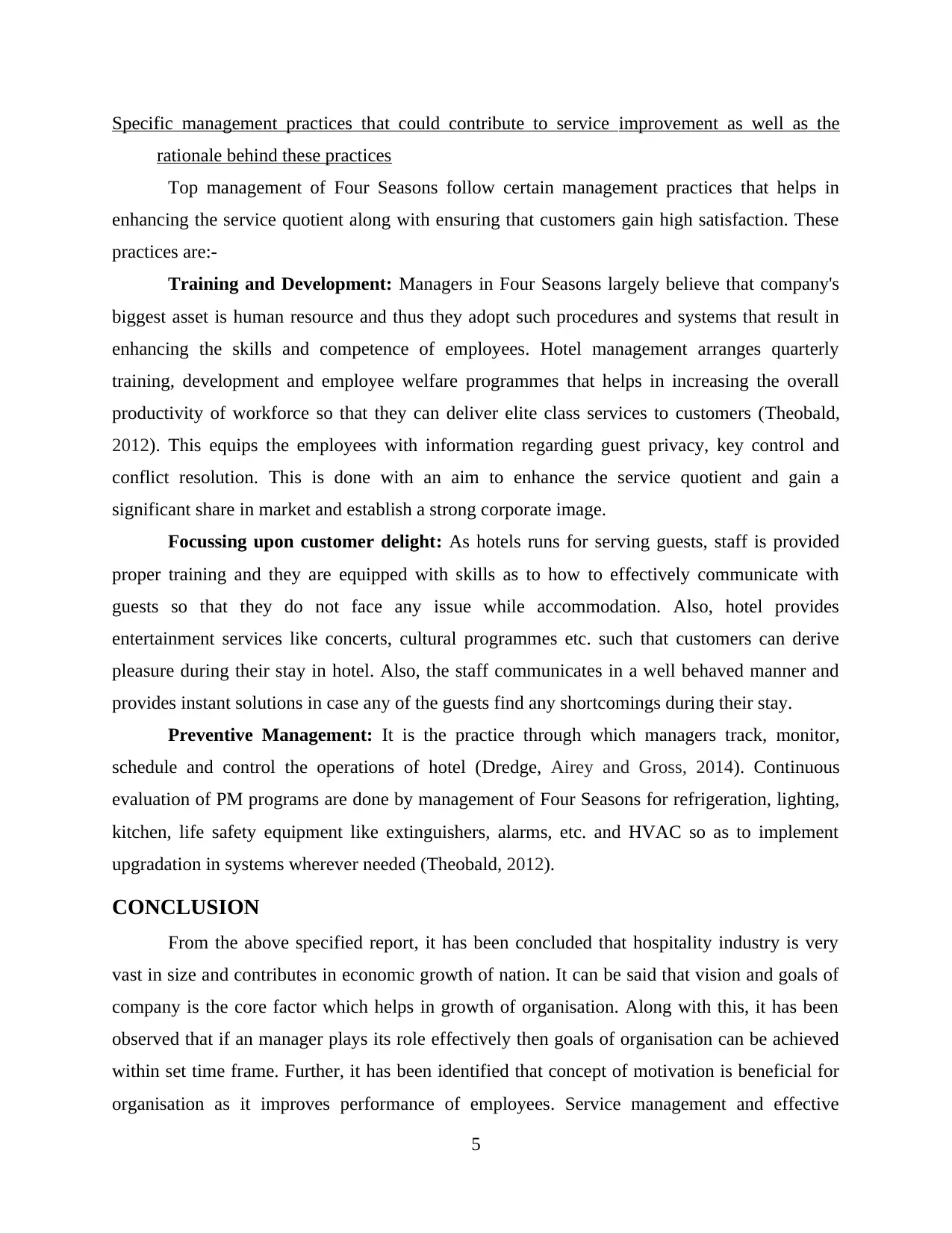
Specific management practices that could contribute to service improvement as well as the
rationale behind these practices
Top management of Four Seasons follow certain management practices that helps in
enhancing the service quotient along with ensuring that customers gain high satisfaction. These
practices are:-
Training and Development: Managers in Four Seasons largely believe that company's
biggest asset is human resource and thus they adopt such procedures and systems that result in
enhancing the skills and competence of employees. Hotel management arranges quarterly
training, development and employee welfare programmes that helps in increasing the overall
productivity of workforce so that they can deliver elite class services to customers (Theobald,
2012). This equips the employees with information regarding guest privacy, key control and
conflict resolution. This is done with an aim to enhance the service quotient and gain a
significant share in market and establish a strong corporate image.
Focussing upon customer delight: As hotels runs for serving guests, staff is provided
proper training and they are equipped with skills as to how to effectively communicate with
guests so that they do not face any issue while accommodation. Also, hotel provides
entertainment services like concerts, cultural programmes etc. such that customers can derive
pleasure during their stay in hotel. Also, the staff communicates in a well behaved manner and
provides instant solutions in case any of the guests find any shortcomings during their stay.
Preventive Management: It is the practice through which managers track, monitor,
schedule and control the operations of hotel (Dredge, Airey and Gross, 2014). Continuous
evaluation of PM programs are done by management of Four Seasons for refrigeration, lighting,
kitchen, life safety equipment like extinguishers, alarms, etc. and HVAC so as to implement
upgradation in systems wherever needed (Theobald, 2012).
CONCLUSION
From the above specified report, it has been concluded that hospitality industry is very
vast in size and contributes in economic growth of nation. It can be said that vision and goals of
company is the core factor which helps in growth of organisation. Along with this, it has been
observed that if an manager plays its role effectively then goals of organisation can be achieved
within set time frame. Further, it has been identified that concept of motivation is beneficial for
organisation as it improves performance of employees. Service management and effective
5
rationale behind these practices
Top management of Four Seasons follow certain management practices that helps in
enhancing the service quotient along with ensuring that customers gain high satisfaction. These
practices are:-
Training and Development: Managers in Four Seasons largely believe that company's
biggest asset is human resource and thus they adopt such procedures and systems that result in
enhancing the skills and competence of employees. Hotel management arranges quarterly
training, development and employee welfare programmes that helps in increasing the overall
productivity of workforce so that they can deliver elite class services to customers (Theobald,
2012). This equips the employees with information regarding guest privacy, key control and
conflict resolution. This is done with an aim to enhance the service quotient and gain a
significant share in market and establish a strong corporate image.
Focussing upon customer delight: As hotels runs for serving guests, staff is provided
proper training and they are equipped with skills as to how to effectively communicate with
guests so that they do not face any issue while accommodation. Also, hotel provides
entertainment services like concerts, cultural programmes etc. such that customers can derive
pleasure during their stay in hotel. Also, the staff communicates in a well behaved manner and
provides instant solutions in case any of the guests find any shortcomings during their stay.
Preventive Management: It is the practice through which managers track, monitor,
schedule and control the operations of hotel (Dredge, Airey and Gross, 2014). Continuous
evaluation of PM programs are done by management of Four Seasons for refrigeration, lighting,
kitchen, life safety equipment like extinguishers, alarms, etc. and HVAC so as to implement
upgradation in systems wherever needed (Theobald, 2012).
CONCLUSION
From the above specified report, it has been concluded that hospitality industry is very
vast in size and contributes in economic growth of nation. It can be said that vision and goals of
company is the core factor which helps in growth of organisation. Along with this, it has been
observed that if an manager plays its role effectively then goals of organisation can be achieved
within set time frame. Further, it has been identified that concept of motivation is beneficial for
organisation as it improves performance of employees. Service management and effective
5
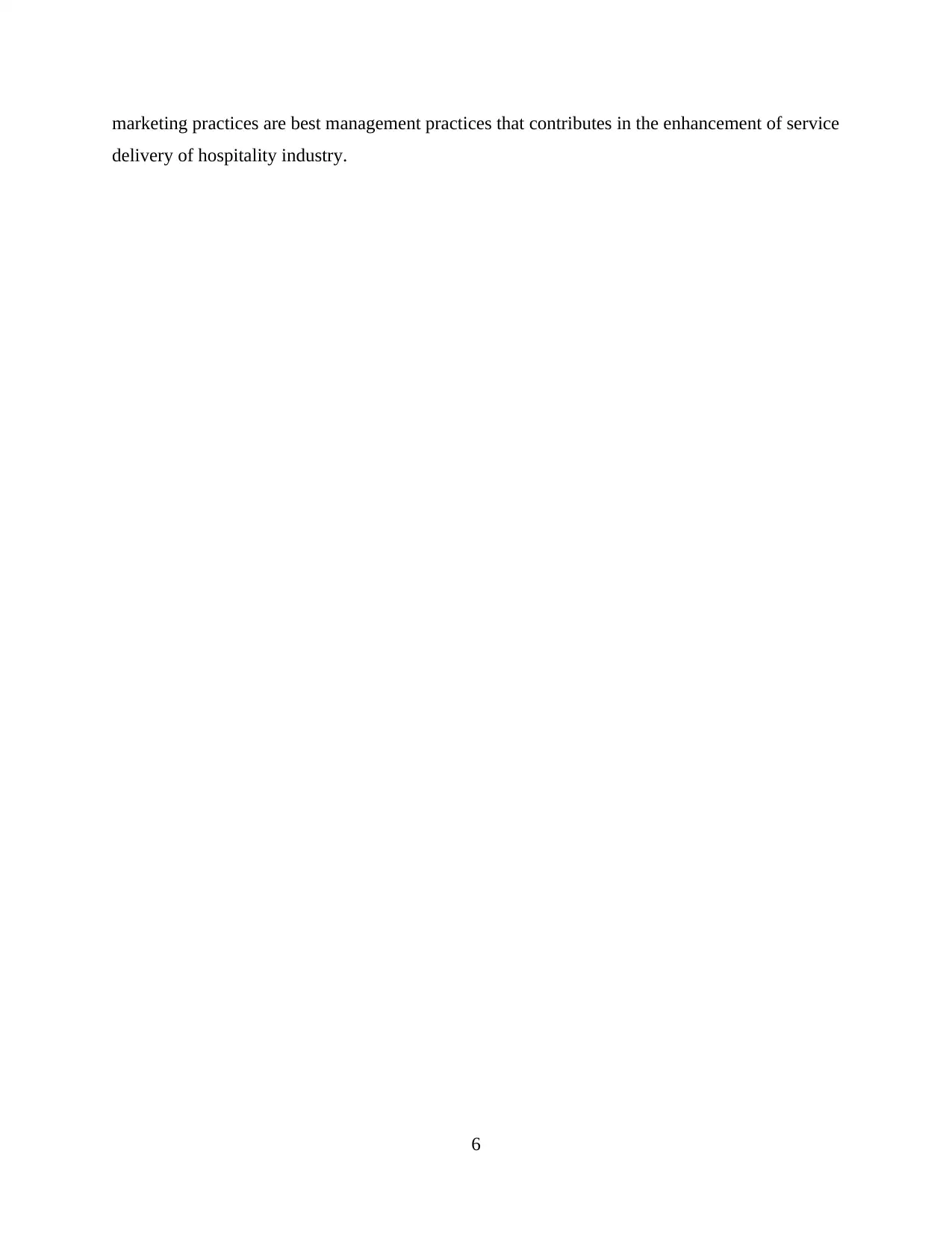
marketing practices are best management practices that contributes in the enhancement of service
delivery of hospitality industry.
6
delivery of hospitality industry.
6
⊘ This is a preview!⊘
Do you want full access?
Subscribe today to unlock all pages.

Trusted by 1+ million students worldwide
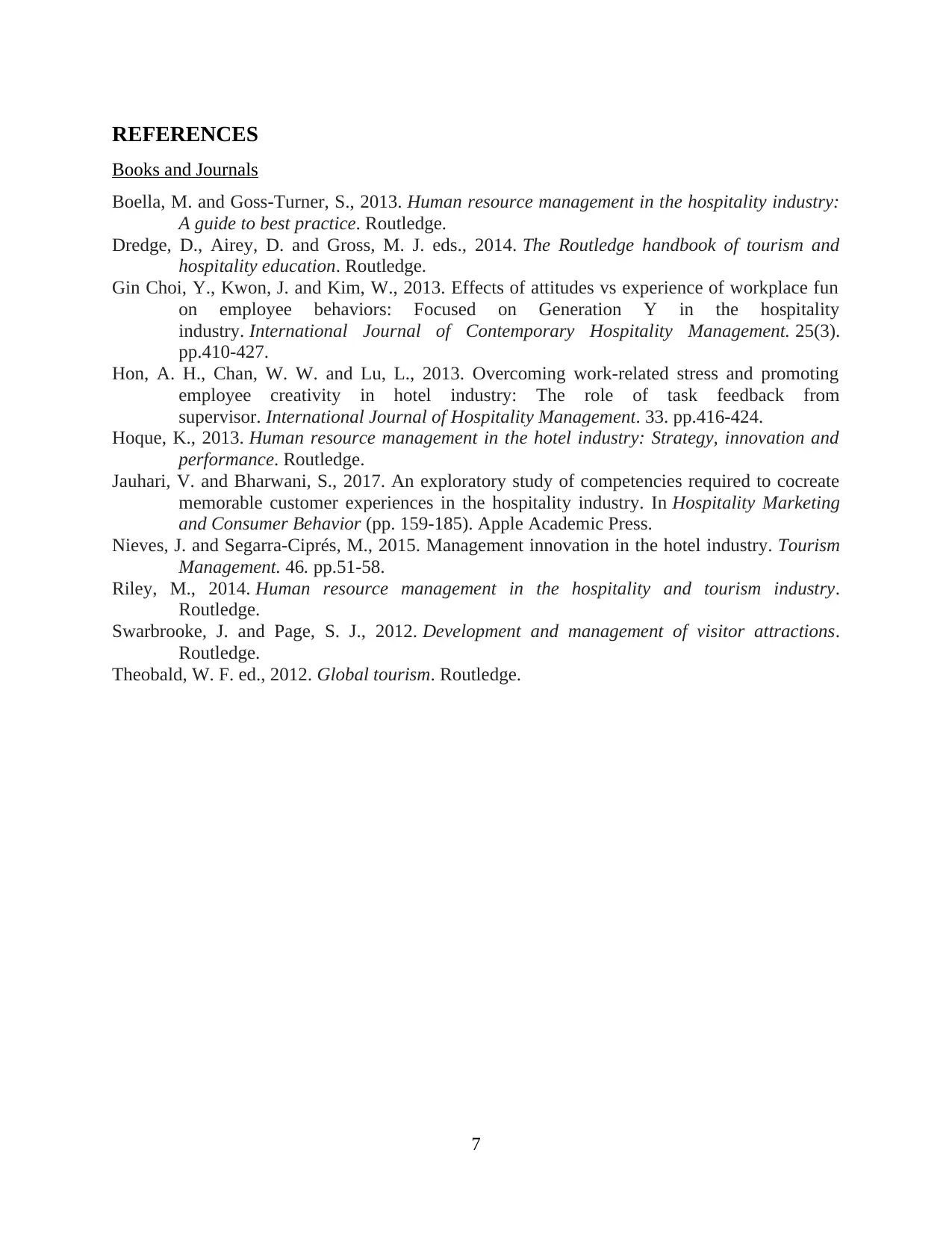
REFERENCES
Books and Journals
Boella, M. and Goss-Turner, S., 2013. Human resource management in the hospitality industry:
A guide to best practice. Routledge.
Dredge, D., Airey, D. and Gross, M. J. eds., 2014. The Routledge handbook of tourism and
hospitality education. Routledge.
Gin Choi, Y., Kwon, J. and Kim, W., 2013. Effects of attitudes vs experience of workplace fun
on employee behaviors: Focused on Generation Y in the hospitality
industry. International Journal of Contemporary Hospitality Management. 25(3).
pp.410-427.
Hon, A. H., Chan, W. W. and Lu, L., 2013. Overcoming work-related stress and promoting
employee creativity in hotel industry: The role of task feedback from
supervisor. International Journal of Hospitality Management. 33. pp.416-424.
Hoque, K., 2013. Human resource management in the hotel industry: Strategy, innovation and
performance. Routledge.
Jauhari, V. and Bharwani, S., 2017. An exploratory study of competencies required to cocreate
memorable customer experiences in the hospitality industry. In Hospitality Marketing
and Consumer Behavior (pp. 159-185). Apple Academic Press.
Nieves, J. and Segarra-Ciprés, M., 2015. Management innovation in the hotel industry. Tourism
Management. 46. pp.51-58.
Riley, M., 2014. Human resource management in the hospitality and tourism industry.
Routledge.
Swarbrooke, J. and Page, S. J., 2012. Development and management of visitor attractions.
Routledge.
Theobald, W. F. ed., 2012. Global tourism. Routledge.
7
Books and Journals
Boella, M. and Goss-Turner, S., 2013. Human resource management in the hospitality industry:
A guide to best practice. Routledge.
Dredge, D., Airey, D. and Gross, M. J. eds., 2014. The Routledge handbook of tourism and
hospitality education. Routledge.
Gin Choi, Y., Kwon, J. and Kim, W., 2013. Effects of attitudes vs experience of workplace fun
on employee behaviors: Focused on Generation Y in the hospitality
industry. International Journal of Contemporary Hospitality Management. 25(3).
pp.410-427.
Hon, A. H., Chan, W. W. and Lu, L., 2013. Overcoming work-related stress and promoting
employee creativity in hotel industry: The role of task feedback from
supervisor. International Journal of Hospitality Management. 33. pp.416-424.
Hoque, K., 2013. Human resource management in the hotel industry: Strategy, innovation and
performance. Routledge.
Jauhari, V. and Bharwani, S., 2017. An exploratory study of competencies required to cocreate
memorable customer experiences in the hospitality industry. In Hospitality Marketing
and Consumer Behavior (pp. 159-185). Apple Academic Press.
Nieves, J. and Segarra-Ciprés, M., 2015. Management innovation in the hotel industry. Tourism
Management. 46. pp.51-58.
Riley, M., 2014. Human resource management in the hospitality and tourism industry.
Routledge.
Swarbrooke, J. and Page, S. J., 2012. Development and management of visitor attractions.
Routledge.
Theobald, W. F. ed., 2012. Global tourism. Routledge.
7
1 out of 10
Related Documents
Your All-in-One AI-Powered Toolkit for Academic Success.
+13062052269
info@desklib.com
Available 24*7 on WhatsApp / Email
![[object Object]](/_next/static/media/star-bottom.7253800d.svg)
Unlock your academic potential
Copyright © 2020–2025 A2Z Services. All Rights Reserved. Developed and managed by ZUCOL.





